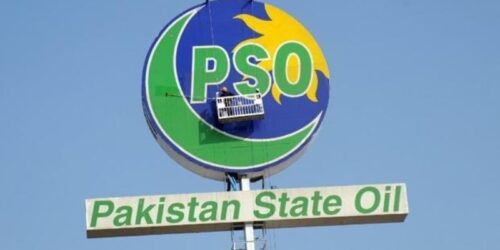With record Rs520 billion receivables on its books, the state-run Pakistan State Oil (PSO) is struggling with oil supply management as private firms and banks try to limit their exposure and volatile international oil market players prefer cash and higher premium.
In a report sent to the federal government, the cash-starved leading fuel supplier has said its total receivables stood at Rs519.485bn on April 14 and counting as power companies, gas utilities and other public sector entities as well as the government hold back large amounts on various counts. That leaves the company’s financials in shambles and its financial managers in awe — top one of them considering other job options within months after joining.
As a consequence, PSO has a build-up of its necessary payables of more than Rs265bn, including Rs223bn to foreign long suppliers of natural gas, petroleum products and matured letters of credit (LCs). Some of these LCs or standby letters of credit are strategically critical, a senior official told Dawn.
An amount of Rs42.5bn is payable to local fuel suppliers — Rs23.4bn to Pak-Arab Refinery, Rs8.73bn to Pakistan Refinery, Rs6.73bn to Attock Refinery, Rs2bn to National Refinery and Rs1.6bn to ENAR Petrotech.
As if that was not enough, the government has assigned PSO the additional responsibility of facilitating workings and making payments to other oil marketing companies (OMCs) on account of price differential claims arising out of sale of petroleum products to consumers at rates significantly lower than the purchasing price.
Informed sources said the national fuel supplier required about Rs100bn on an urgent basis to keep the fuel market liquid. However, the government would need to make at least Rs35bn payment within days against price differential it has already borne on its own for April 1-15 for which the previous government had neither made any allocation nor approved additional fund.
In the given circumstances, PSO is finding it difficult to arrange fuel molecules as demand for jet fuel and high speed diesel (HSD) has increased in the international market and market players are preferring cash payments and higher premiums on delayed payments. The premium for HSD supplies has fluctuated between $8 and $13 per tonne in recent weeks compared to less than $2.5 a few months ago.
No wonder then, the country’s overall stocks of jet fuel and HSD have declined to about 12 days as of Saturday last week against a 24-day cover earlier this month.
Ironically, these stocks may appear good on average but are not evenly available across the country. For example, HSD stocks in Punjab are available for less than 10 days while these range between 14 and 15 days in three other provinces and just for seven days in Gilgit.
Likewise, petrol stocks in Punjab will last less than nine days, followed by 10 days in Khyber Pakhtunkhwa and Balochistan, 46 days in Sindh and seven days in Gilgit.
With peak fuel demand for power generation in the absence of sufficient LNG supplies and water storage in dams, total furnace oil stocks are no more than 125,000 tonnes, or less than 10 days, for power generation.
Local refineries, on the other hand, also try not to accumulate their stuck funds with various market players and tend to complain about lower availability of crude cargos. They import one cargo for a period where they should arrange two cargos and attribute lower imports to suppliers. As a result, refineries had total average crude stocks of just eight days on the last working day (Friday) last week. Of this, Attock and Cnergyico refineries had crude stocks for three and four days, respectively, followed by eight days each with Parco, 12 days with National Refinery and 18 days with Pakistan Refinery.
In such conditions when smaller OMCs face problems in meeting their licensing requirements to ensure sufficient product stocks, the burden shifts to PSO being the national fuel supplier. As a result, its market share has increased by 3-5pc in various products over the last couple of months amid over 22 per cent surge in consumption.
Sources in PSO said the largest recoverable amount of Rs272bn was pending against Sui Northern Pipelines Limited and Rs6.8bn against Sui Southern Gas Company Limited. Thus total dues on account of liquefied natural gas against the two gas utilities stood at Rs279bn.
This was followed by Rs167.4bn total outstanding against power companies, including Rs141bn against state-owned entities, Rs21bn against Hubco and Rs5.2bn against Kapco. Another Rs73bn is payable against other government accounts, including Rs23bn against PIA, Rs40bn claims against the government and Rs10.5bn exchange rate adjustment against the government.





